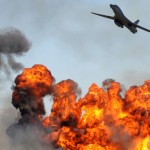By John Ubaldi, alumnus of American Military University
As the U.S. contemplates a political and military strategy in confronting the threat posed by ISIS, we have another example of war as a first option in U.S. foreign policy. The ability to wage war is an important element of U.S. national power, but should be used only when all other elements of U.S. national power have been exhausted.
Too often, U.S. foreign policy experts believe it’s either a military option or it’s nothing at all. National security strategists never seem to understand how to utilize all elements of U.S national power to achieve a desired outcome.

One only has to be reminded of the wise council of Winston Churchill who said:
“Never, never, never believe any war will be smooth and easy or that anyone who embarks on that strange voyage can measure the tides and hurricanes he will encounter. The statesman who yields to war fever must realize that once the signal is given, he is no longer the master of policy but the slave of unforeseeable and uncontrollable events…incompetent or arrogant commanders, untrustworthy allies, hostile neutrals, malignant fortune, ugly surprise, awful miscalculations.”
Sun Tzu in his famous military treatise said:
“If you know the enemy and know yourself, you need not fear the result of a hundred battles. If you know yourself but not the enemy, for every victory gained you will also suffer a defeat. If you know neither the enemy nor yourself, you will succumb in every battle.”
We have been involved in the Middle East for decades, but it still seems we do not have an effective strategy to leverage our national power to affect change in the region.
After November’s mid-term election we will begin the process of selecting a new president. We need to understand how each potential candidate will conduct U.S. foreign policy.
It seems the U.S. consistently fails to develop strategies that effectively deploy all the elements of our national power, including war. One only has to remember the axiom of Clausewitz, “War is not a mere act of policy but a true political instrument, a continuation of political activity by other means.”
About the Author: John Ubaldi is President of Ubaldi Reports which provides credible, political content, addressing domestic and global issues written by military veterans with expertise on domestic and international issues. He has a Master’s in National Security Studies from American Military University with a concentration in Middle Eastern Studies and a Bachelor’s in Government from California State University, Sacramento.